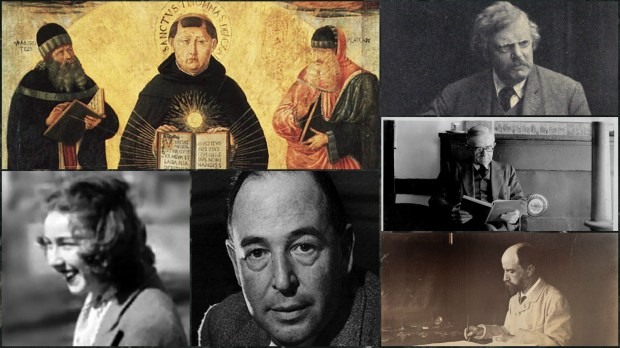Lenten Campaign 2025
This content is free of charge, as are all our articles.
Support us with a donation that is tax-deductible and enable us to continue to reach millions of readers.
Saint Thomas Aquinas is not a name casually brought up around the dinner table. His writings, for the average American, are like a mountain that remains in the distance, never to be scaled or explored. If his name is ever mentioned, it is by that strange family member who likes learning and who reads books all the time.
This is unfortunate, as Thomas Aquinas, who was called “The Dumb Ox” in his lifetime, has a wealth of knowledge that can benefit everyone and his rational arguments can help people form their own arguments in defense of the true, the good and the beautiful.
Over the centuries since his death many have found inspiration in his life and writings, and his influence extends even beyond the confines of the Catholic Church. In particular, Thomas Aquinas’ writings have greatly influenced countless authors, both past and present, and helped shape their own works and philosophies.
For the purposes of this article, here are five popular authors of the past century who devoured the scholarly work of Thomas Aquinas and integrated it into their various endeavors. (Author’s note: If you are interested in learning more about Saint Thomas Aquinas and his most famous work, the Summa, read Peter Kreeft’s book aimed at the modern reader, A Summa of the Summa. If you want to learn about his life, tryChesterton’s Saint Thomas Aquinas: The Dumb Ox or Louis De Wohl’s The Quiet Light: A Novel About Saint Thomas Aquinas)
“The difficulty of dealing with St. Thomas Aquinas in this brief article is the difficulty of selecting that aspect of a many-sided mind which will best suggest its size or scale. Because of the massive body which carried his massive brain, he was called ‘The Ox;’ but any attempt to boil down such a brain into tabloid literature passes all possible jokes about an ox in a teacup. He was one of the two or three giants; one of the two or three greatest men who ever lived; and I should never be surprised if he turned out, quite apart from sanctity, to be the greatest of all.”
— G.K. Chesterton, author of Orthodoxy
“Saint Thomas is still alive and overshadows as many schools as he ever did; at all events, as many as the Church maintains. He has outlived Descartes and Leibnitz and a dozen other schools of philosophy more or less serious in their day. He has mostly outlived Hume, Voltaire, and the militant sceptics. His method is typical and classic; his sentences, when interpreted by the Church, seem, even to an untrained mind, intelligible and consistent; his Church Intellectual remains practically unchanged, and, like the Cathedral of Beauvais, erect, although the storms of six or seven centuries have prostrated, over and over again, every other social or political or juristic shelter.”
— Henry Adams, grandson of John Quincy Adams, author of History of the United Statesand The Education of Henry Adams
“I couldn’t make any judgment on the Summa, except to say this: I read it every night before I go to bed. If my mother were to come in during the process and say, ‘Turn off that light. It’s late,’ I with lifted finger and broad, bland, beatific expression, would reply, ‘On the contrary, I answer that the light, being eternal and limitless, cannot be turned off. Shut your eyes,’ or some such thing. In any case I feel I can personally guarantee that St. Thomas loved God because for the life of me I cannot help loving St. Thomas.”
— Flannery O’Connor, author of Wise Blood
“Even when I feared and detested Christianity, I was struck by its essential unity, which, in spite of its divisions, it has never lost. I trembled on recognizing the same unmistakable aroma coming from the writings of Dante and Bunyan, Thomas Aquinas and William Law.”
— C.S. Lewis, author of The Chronicles of Narnia
“According to St. Thomas Aquinas, man is more than an individual with individual rights, he is a person with personal duties toward God, himself, and his fellow man. As a person, man cannot serve God without serving the common good.”
— Peter Maurin, author of Easy Essays

